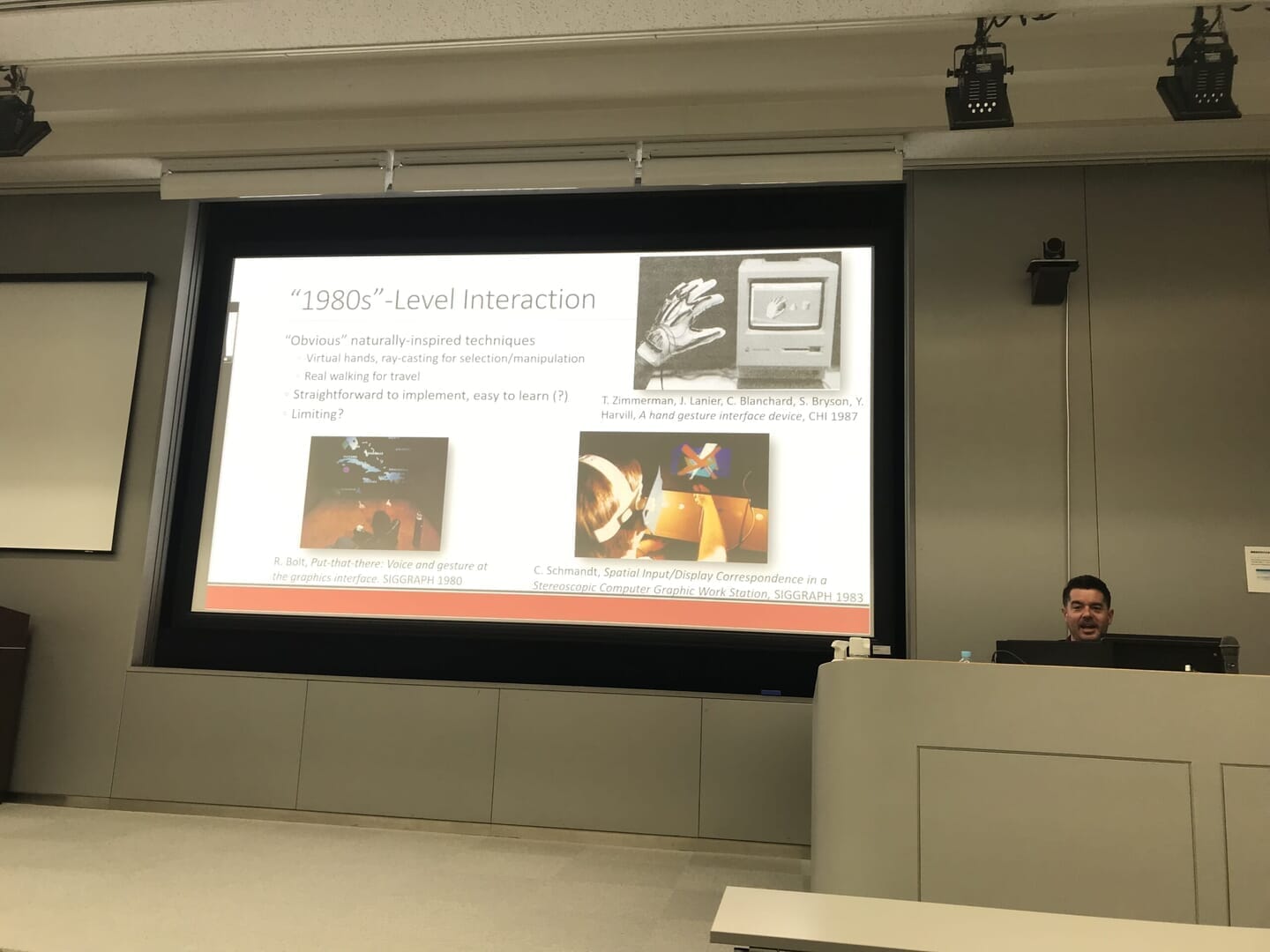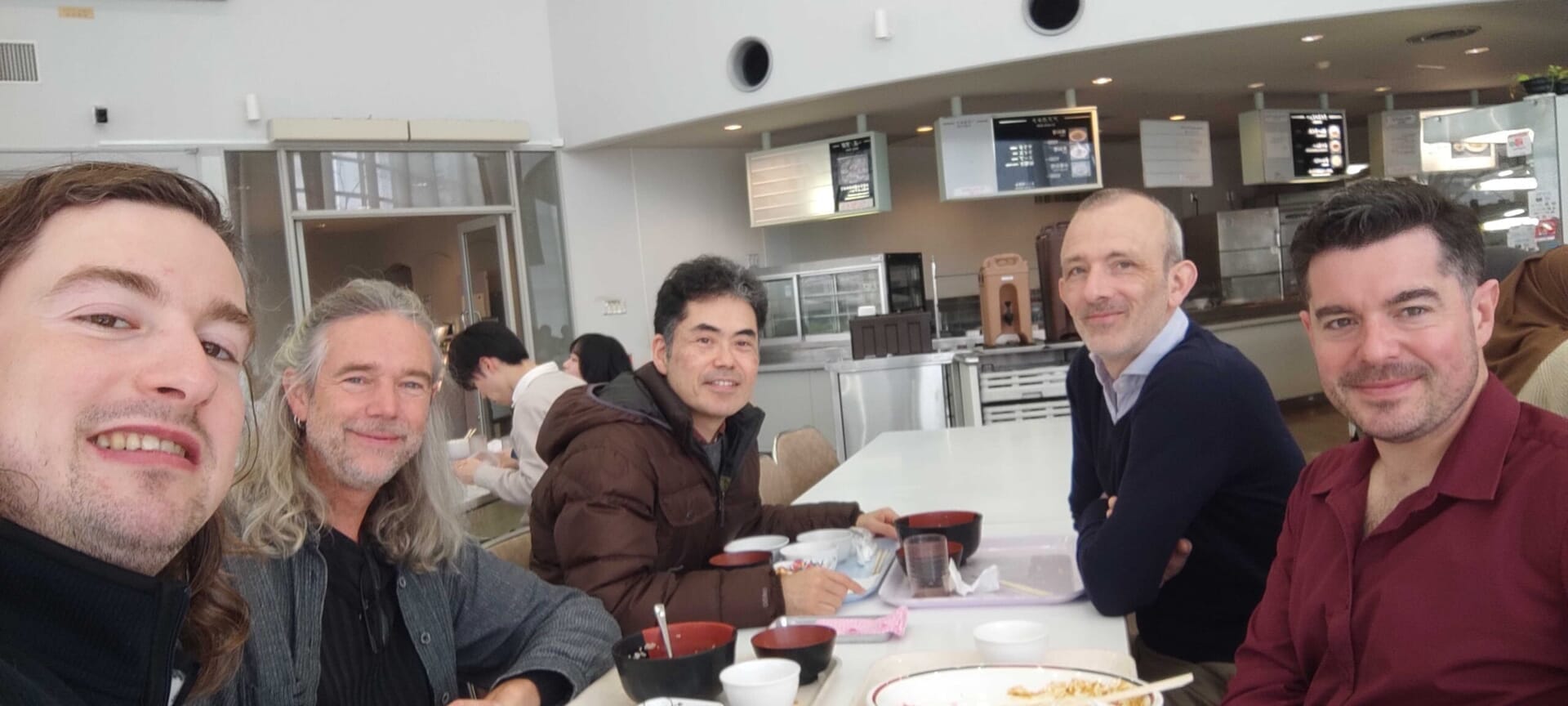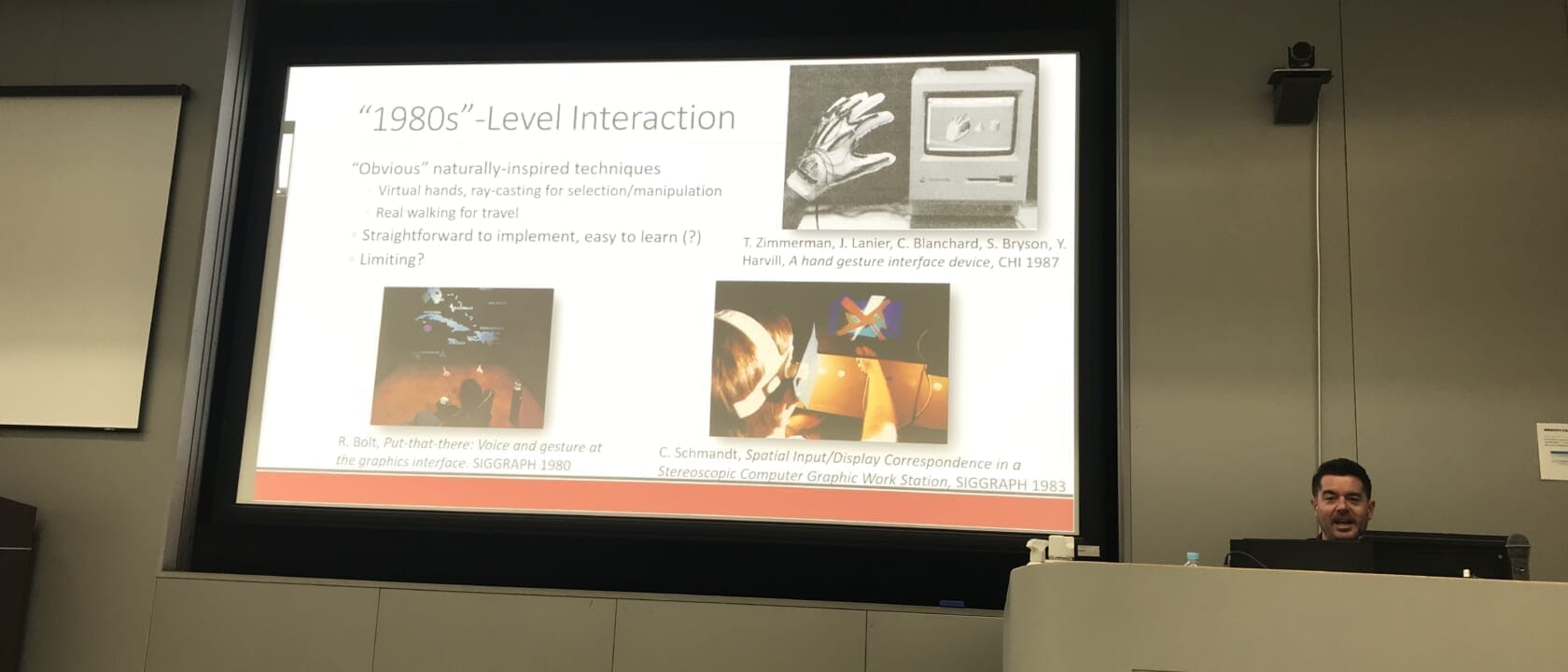On February 29, 2024, Dr. Rob Teather, a JSPS Invitation Fellow, delivered an invited lecture. On March 1, Dr. Ernst Kruijff and Dr. Bernhard Riecke, both here on a short-term visit for collaborative research, jointly gave an invited lecture.
Title: The New Reality of Extended Reality: Empirical Evaluation of Interaction in XR
Speaker: Rob Teather, Carleton University, Canada
Abstract: Extended reality (XR), a catch-all term for virtual reality (VR), mixed reality (MR) and augmented reality (AR) has recently become popular again with the release of low-cost and effective consumer-grade head-mounted displays such as the Meta Quest. The longstanding dream of VR has users interacting with virtual objects as naturally as real ones. In practice, despite technological advances, numerous technical and human factors make this difficult. Modern VR interaction continues to employ naturally-inspired interaction techniques that have changed little since their introduction in the late 80s. Similarly, cybersickness and the lack of tactile feedback when interacting with virtual objects are well-known to limit the effectiveness of VR systems, yet these issues persist today. In this talk, I will discuss my research addressing these three interrelated areas of virtual reality interaction. I will first describe my studies comparing 3D selection interfaces between 3D and desktop systems, and my work in extending a standardized methodology to support fair and direct comparison between these two different modalities. I will then discuss my research group’s recent work employing this standardized methodology for evaluating novel 3D selection methods, as well as other projects aimed at enhancing the usability of VR systems through evaluating the effectiveness of cybersickness reduction techniques and novel approaches to VR haptics that employ shape-changing devices and perceptual illusions. I will close by discussing future directions for this work on both improving usability of, and equitable access to, VR technology.
Bio:
https://www.csit.carleton.ca/~rteather/
Robert J. Teather is a leading expert in several interrelated areas of human-computer interaction, including interaction techniques and input devices, especially when applied to 3D user interfaces for virtual reality. He holds a PhD and MSc in Computer Science (York University, Canada), as well as a BSc in Computer Science (Brock University, Canada). His PhD work focused on developing standardized methods for the empirical comparison of input devices for 3D interaction – primarily in order to compare mouse and 3D tracker-based input. To this end, Dr. Teather has established himself as an expert in comparing drastically different input devices and interaction techniques for common fundamental interaction tasks in VR (e.g., target selection), across varying system configurations (e.g., display properties such as stereo graphics, or system properties such as latency). His research is supported by Natural Sciences and Engineering Research Council of Canada (NSERC) and the Canada Foundation for Innovation. He has also served in lead conference organization roles (e.g., general chair, technical program chair) in events including the IEEE Conference on Virtual Reality & 3D User Interfaces, ACM Virtual Reality Software and Technology, and the ACM Symposium on Spatial User Interaction.
Title: From multi-sensory feedback to embodiment in computer-mediated
environment – are you awed yet?
Speakers: Ernst Kruijff, Bonn-Rhein-Sieg University of Applied Sciences and
Bernhard Riecke, Simon Fraser University
Abstract:
This talk dives into various aspects of designing and developing
systems that incorporate multi-sensory feedback and embodiment to
create immersive applications that can be more productive or
effective, yet also may target alternative motivations like artistic
or therapeutic scenarios. Applications discussed span the range from
robotics to artistic installations. By doing so, we will cover a range
of multi-sensory feedback methods, especially haptics, that aim to
incorporate more of the human body beyond just eyes, ears, and
hand-held controllers. Thereby, we explore both conventional and
unconventional methods, including full-body vibration, neuromuscular
stimulation, and soft-body feedback.
Bios:
https://www.h-brs.de/en/inf/dr-ernst-kruijff
Ernst Kruijff is Professor for Human Computer Interaction at the
Department of Computer Science, Bonn-Rhein-Sieg University of Applied
Sciences and co-director of the Institute of Visual Computing (IVC).
He is also Adjunct Professor at the School of Interactive Arts and
Technology (SIAT) at Simon Fraser University, Canada. His scientific
interests encompass the human-factors driven analysis, design and
validation of multisensory 3D user interfaces. Specifically, his
research looks at the usage of audio-tactile (haptic) feedback methods
to enhance interaction and perception within the frame of Augmented
Reality view management, Virtual Reality navigation and hybrid 2D/3D
mobile systems. Thereby, he specifically looks at improving awareness
about the objects surrounding the user in 3D space, which can greatly
affect typical 3D user interface tasks like selection, manipulation
and navigation. He has acquired (DFG, EU FP7) and coordinated various
national and international research projects while working at
institutions in Germany (IVC, Fraunhofer, Bauhaus-University) and
Austria (TU Graz, CURE). He received his PhD from the Institute of
Computer Graphics and Vision at the TU Graz (with honors) and has
published and presented his research at conferences including ACM
SIGGRAPH, CHI and SUI, and IEEE VR and 3DUI. He is also the co-author
of the book 3D User Interfaces: Theory and Practice, together with
LaViola, McMahan, Bowman and Poupyrev (Addison-Wesley, 2017). If you
are interested in a BA/MA/PhD thesis and like to work in an exciting
lab, feel free to contact him, as he is always looking for motivated
students. He currently supervises three PhD students: Christina
Trepkowski (with P. König, University of Osnabrück), Alexander
Marquardt (with J. Schöning, University of Bremen), and Saugata Biswas
(with J. Schöning, University of Bremen), and is a member of GI NRW.
Current active collaboration partners include SIAT at Simon Fraser
University (Prof. Riecke/Stuerzlinger, the CARE lab at NAIST (Prof.
Kiyokawa) and the Computer Graphics and User Interfaces lab at
Columbia University (Prof. Feiner). For more collaborations, please
refer to the projects page. His work has won multiple awards from IEEE
and ACM, including the IEEE ISMAR Impact Award in 2022 for his paper
on perceptual issues in Augmented Reality.
https://www.sfu.ca/siat/people/research-faculty/bernhard-riecke.html
Bernhard Riecke is a psycho-physicist and Cognitive Scientist who’s
excited about studying how humans orient in virtual and real
environments. He received his PhD in Physics from the Tübingen
University in Germany and researched for a decade in the Virtual
Reality group of the Max Planck Institute for Biological Cybernetics
in Germany. After a post-doc in Psychology at Vanderbilt University he
joined the School of Interactive Arts & Technology of Simon Fraser
University as an assistant professor in 2008. His research approach
combines fundamental scientific research with an applied
perspective of improving human-computer interaction. He combines
multi-disciplinary research approaches and immersive virtual
environments to investigate what constitutes effective, robust,
embodied and intuitive human spatial cognition, orientation
and behaviour (and many other things as you can see on the projects
pages). This fundamental knowledge is used to guide the design of
novel, more effective human-computer interfaces and interaction
paradigms that enable similar processes in computer-mediated
environments like virtual reality (VR) and multi-media. These
improved interfaces can then enable and inspire further research,
both fundamental and applied.


